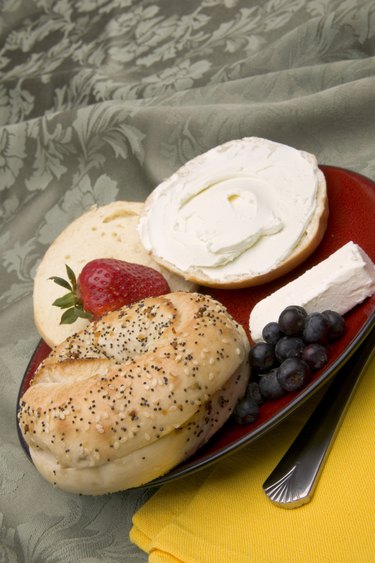 Cream cheese is usually the main ingredient in a cheese ball. Image Credit: Jupiterimages/liquidlibrary/Getty Images
Cream cheese is usually the main ingredient in a cheese ball. Image Credit: Jupiterimages/liquidlibrary/Getty Images
Cheese balls usually comprise soft cheeses mixed with other firmer cheeses, seasonings and spices. These spreadable little balls of cheese require refrigeration to prevent spoilage, but even in the refrigerator, they won't last forever. When consistently refrigerated, these tasty appetizers usually last around two weeks, depending on their ingredients, although commercially prepared and sealed cheese balls may last longer than homemade.
Let the Ingredients Dictate
Most cheese balls contain a mixture of cream cheese, other soft cheeses, shredded harder cheeses, herbs, seasonings and spices. Some cheese balls may even include fresh fruit, vegetables, smoked fish or a variety of other ingredients. Once you mix your cheese ball components together, form them into a ball and roll it in garnishing ingredients like nuts, seeds or crushed crackers. Unfortunately, the shelf life of cheese balls can vary because they will last only as long as the ingredient they contain with the shortest shelf life. For example, cheese balls made with smoked salmon will last only around one week, the average shelf life of the fish.
The Tasty Life
The average homemade cheese ball made from cream cheese and no veggies, fruit or meats lasts around two weeks in an airtight container, when refrigerated at 40 degrees Fahrenheit or below. Commercially prepared cheese balls may contain preservatives such as high amounts of salt that will extend their shelf life. Because the individual shelf life of each kind of commercial cheese ball may vary, manufacturers print the "best by" date on the package containing it. This date typically lets the buyer know when the cheese ball will be at its optimum quality, but not necessarily when it will definitely go bad. Use this date as a guide to help you determine if your cheese ball is still good.
Good Cheese Balls Go Bad
Use your senses to determine if your cheese ball has gone bad. Signs of spoilage include an unpleasant odor, visible signs of mold and an unappetizing taste. Once your cheese ball goes bad, discard it. Although you can sometimes cut the moldy bits off hard cheeses, you can't do that with cheese balls. The mold filaments will penetrate throughout the soft cheese, making it unsafe to simply cut away. If you suspect that your cheese ball has spoiled based on its appearance or age, don't taste it as a way to confirm; the nasty bacteria and mold that can grow in a cheese ball will make you sick.
How Long Is the Party
Cheese balls are usually served as appetizers at parties, but they shouldn't be left out to serve your guests for more than two hours at a time. When left out at room temperature for a long time, harmful microorganisms can grow within the cheese ball and make you sick when you eat it, although it may still look and taste okay. Store your leftover cheese ball in a sealed plastic container to keep it from drying out in your fridge. Although freezing can extend the life of your cheese balls, soft cheeses don't freeze well and develop an unpleasantly crumbly texture when thawed.


